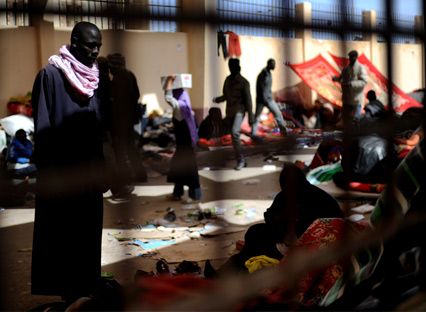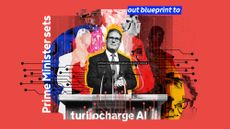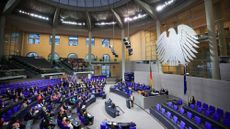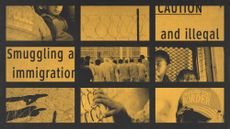How Libya kept migrantsout of EU - at any cost
Britain was happy to turn a blind eye to Gaddafi’s brutal and inhuman treatment of migrants detained in camps

European leaders have been criticised for the selective humanitarian impulses that impelled them to turn against their erstwhile ally Colonel Gaddafi, while remaining passive in the face of the repression of pro-democracy protests in Yemen or Bahrain. Libyan oil has been cited as one of the main reasons for this discrepancy.
But there is another aspect of European hypocrisy and double-standards in dealing with the Libyan dictator that has received less attention namely Libya's crucial role as a barrier against Europe's unwanted immigrants. With a possible endgame in the Libyan civil war now beginning to emerge, with Gaddafi sending his envoy Abdelati al-Obeidi to Greece to discuss a way out of the conflict, it is worth reminding ourselves of the extent of such cooperation.
For more than a decade the booming Libyan economy has been a destination for legal and illegal migrants from Africa and even further afield in Bangladesh and China. The extended Libyan coast has also been a springboard for undocumented migration into Europe. Following Tony Blair's famous kiss in 2004, Gaddafi entered into a series of agreements with the European Union and individual governments, in which Libya effectively became a co-partner in enforcing Europe's 'externalised' border controls.
Subscribe to The Week
Escape your echo chamber. Get the facts behind the news, plus analysis from multiple perspectives.

Sign up for The Week's Free Newsletters
From our morning news briefing to a weekly Good News Newsletter, get the best of The Week delivered directly to your inbox.
From our morning news briefing to a weekly Good News Newsletter, get the best of The Week delivered directly to your inbox.
Joint naval patrols with Italy; laws penalising illegal immigration; a crackdown on 'people smugglers'; new detention centres and deportation procedures; readmission agreements on migrants intercepted at sea all these developments reflected Libya's new willingness to cooperate with Europe's exclusionary agenda and many of them were part-financed by the EU and Italy. Humanitarian considerations were conspicuously absent from these arrangements. Libya has never signed the 1951 Geneva Refugee Convention and has no functioning asylum system. Economic migrants and refugees in Libya were routinely detained for months and even years in horrendously overcrowded detention centres, where rape, violence and torture were common. Each year thousands of African migrants were deported to the Libyan/Sudanese border and abandoned in the desert, or flown back to their countries of origin on deportation charter flights without being screened to find out whether they were in need of refugee protection. There were also allegations of Libyan coastguard patrols opening fire on migrant boats. These practices were not unknown: many of them were contained in reports by Amnesty International and other human rights organisations. But the same governments that have so vociferously condemned Gaddafi's current violations of human rights had little to say about Libya's brutal and inhuman treatment of migrants.
From Europe's point of view, this system worked extremely well. In Italy and Malta, there was a dramatic reduction in the numbers of migrant arrivals in 2009 as a result of Libyan collaboration. By outsourcing its border controls to a dictatorship without a functioning asylum system, Europe was able to prevent asylum-seekers from reaching its shores, while continuing to proclaim its commitment to the principle of refugee protection. Other EU neighbours have also acted as buffer zones in Europe's immigration controls, including Tunisia and Morocco, Ukraine and Turkey. But none has been as ruthlessly effective as Libya. Gaddafi was a shrewd and cynical manipulator of Europe's immigration obsessions, which provided Libya with a constant flow of money, equipment, technology and also contributed greatly to his own short-lived political rehabilitation.
Last summer he asked the EU for €5bn to prevent Europe from "turning black". In October he received a promise of €50 million over the next three years as part of a 'co-operation agenda' signed by the European Commission. The events of the last two months have made the consequences of this cooperation impossible to ignore.
At the beginning of March, Reuters reported that African migrants were being forcibly inducted into the pro-Gaddafi forces and attacked by rebels who believed that anyone with a black skin was a mercenary. Some 410,000 migrants have fled Libya for neighbouring countries, and the Libyan gateway to Europe appears to be opening once again. Last week, according to UNHCR, more than 2,000 migrants arrived in Malta, prompting the Maltese Green Party to speculate that Gaddafi was deliberately using immigration to pressure the EU using "known blackmail tactics".
According to the Jesuit Refugee Service on Malta, 70 Eritreans, fleeing from Libya, drowned while attempting the same journey. Another 2,000 Eritreans stranded in Tripoli have appealed for international assistance.
It remains to be seen whether the European Union has the will or inclination to intervene on behalf of the migrants that it has tried to keep out for so long or whether, as the ongoing negotiations in Greece continue, it prefers to look for another Libyan government that can fulfill this role with the same zeal and commitment as Muammar Gaddafi.
Sign up for Today's Best Articles in your inbox
A free daily email with the biggest news stories of the day – and the best features from TheWeek.com
-
 The revival of absinthe
The revival of absintheThe Week Recommends The once-banned 'green fairy' is back in demand in cocktail bars around the UK
By Irenie Forshaw, The Week UK Published
-
 How could AI-powered government change the UK?
How could AI-powered government change the UK?Today's Big Question Keir Starmer unveils new action plan to make Britain 'world leader' in artificial intelligence
By Elizabeth Carr-Ellis, The Week UK Published
-
 The UK's first legal drug consumption room
The UK's first legal drug consumption roomThe Explainer 'Potentially transformative moment in UK drugs policy' as The Thistle opens in Glasgow
By The Week UK Published
-
 H-1B visa debate sparks MAGA infighting
H-1B visa debate sparks MAGA infightingIn the Spotlight In defense of the visa program, Elon Musk traded barbs with MAGA supporters over their staunchly anti-immigration stance
By Theara Coleman, The Week US Published
-
 'Regret can be toxic'
'Regret can be toxic'Instant Opinion Opinion, comment and editorials of the day
By Justin Klawans, The Week US Published
-
 New Year's Honours: why the controversy?
New Year's Honours: why the controversy?Today's Big Question London Mayor Sadiq Khan and England men's football manager Gareth Southgate have both received a knighthood despite debatable records
By Harriet Marsden, The Week UK Published
-
 Does Trump have the power to end birthright citizenship?
Does Trump have the power to end birthright citizenship?Today's Big Question He couldn't do so easily, but it may be a battle he considers worth waging
By Joel Mathis, The Week US Published
-
 'Underneath the noise, however, there's an existential crisis'
'Underneath the noise, however, there's an existential crisis'Instant Opinion Opinion, comment and editorials of the day
By Justin Klawans, The Week US Published
-
 What will Trump's mass deportations look like?
What will Trump's mass deportations look like?Today's Big Question And will the public go along?
By Joel Mathis, The Week US Published
-
 What will Trump do on day one?
What will Trump do on day one?Today's Big Question Presidents often promise immediate action, but rarely deliver
By David Faris Published
-
 'This needs to be a bigger deal'
'This needs to be a bigger deal'Instant Opinion Opinion, comment and editorials of the day
By Justin Klawans, The Week US Published